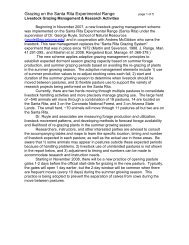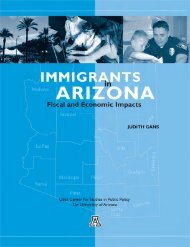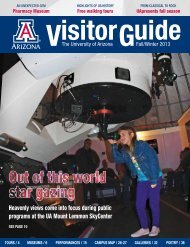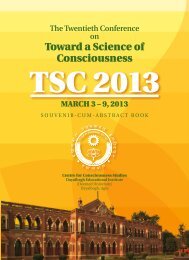CONSCIOUSNESS
Download - Center for Consciousness Studies - University of Arizona
Download - Center for Consciousness Studies - University of Arizona
- No tags were found...
Create successful ePaper yourself
Turn your PDF publications into a flip-book with our unique Google optimized e-Paper software.
1. Philosophy 81<br />
potential to become conscious. My own sympathies are broadly functionalist. I argue that<br />
the right sort of account of unconscious mental states needs to account for both the mentality<br />
and the intentionality of the state. I propose a phenomenal-functionalist account that satisfies<br />
these two adequacy conditions. On the phenomenal-functionalist account proposed, an<br />
unconscious state of type T is an unconscious intentional mental state of a system just case: (i)<br />
The system’s type T states are regularly semantically influenced by conscious mental states.<br />
In order for an unconscious state to be semantically influenced by conscious mental states, it<br />
must be semantically influenced by conscious top-down factors such as attention, intention,<br />
expectations, goals, task representations, and perceptual recognition. (ii) The system’s type T<br />
states normally reliably guide action or the production of other mental states. An unconscious<br />
state of type T is a mental state if the first criterion is satisfied, and an unconscious state of type<br />
T is an intentional state if the second criterion is satisfied. While my proposal is consistent<br />
with various non-materialist approaches to mental states, it should also have special appeal<br />
for those of functionalist disposition who have been wary of classical dispositionalist and<br />
interpretivist approaches to mental states. C1<br />
82 It’s All in Peirce! Modern Theories of Consciousness Were Prefigured in Peirce’s<br />
Tripartite Logic Allan Combs (Transformative Inquiry,<br />
California Institute of Integral Studies (CIIS), Santa Rosa, CA)<br />
It has been said that the three pillars of William James’ thought, radical empiricism, noetic<br />
pluralism, and pragmatism, were influenced by Charles Sanders Peirce’s notions of firstness,<br />
secondness, and thirdness (Taylor, 2009). Interestingly, an analysis of Vimal’s (2009) exhaustive<br />
review of contemporary meanings attributed to the word consciousness suggests that<br />
virtually all of them can also be understood as variations on Peirce’s three basic themes. Thus,<br />
they are mirrored in James’s three-part philosophy as well. For example, theories of consciousness<br />
as experience - qualia, ‘what it is like..,’ phenomenological approaches, etc.’are instances<br />
of firstness, i.e., initial pre-conceptualized or ‘raw’ experience. Peirce himself equated<br />
phenomenology, or phaneroscopy as he called it (phaneron being a name for ‘all that is in the<br />
mind’), to firstness. Externalism (e.g., Alva Noe), however, corresponds to Peirce’s secondness,<br />
the pre-reflective confrontation of the world in its actuality, as does radial pluralism<br />
(e.g., John Searle). Functional approaches tend to be conceptual, emphasizing relationships<br />
within the physiological processes of the brain (e.g., Walter Freeman), or conceptually considered<br />
processes such as computationalism (e.g., Jerry Fodor, Michael Arbib, Daniel Dennett).<br />
A variation on functionalism that takes its cue from Francisco Varela’s concept of enaction<br />
attempts to combine materialism and functionalism ‘secondness and thirdness’ in a pragmatically<br />
grounded notion of consciousness. Theories of self, on the other hand, virtually all involve<br />
self-reflective dynamics, or thirdness, of one ilk or another. P1<br />
83 The View from Everywhere: Consciousness, Intentionality, and Naturalized<br />
Phenomenology Christian Coseru (Philosophy, College of<br />
Charleston, Charleston, SC)<br />
Recent calls to naturalize phenomenology (Petitot et. al, 1999, Gallagher 2003, 2004,<br />
Thompson 2007) are indicative of the constraints imposed by cognitive science on any tradition<br />
of inquiry that seeks to contribute to its research programs and participate in its internal<br />
disputes. Clearly, if phenomenology can contribute either novel approaches or supporting<br />
evidence to current scientific theories of consciousness and cognition, then, its principles and<br />
its hypotheses need to be aligned with the rest of the available models and methodologies<br />
currently pursuing their candidacy. I argue that the project of naturalizing phenomenology,<br />
while most promising in expanding and refining the embodied and enactive models of cognition,<br />
must take seriously the phenomenologist’s reversal of priority claims (phenomenology<br />
is, or is also (after Husserl), concerned with transcendental subjectivity). Following Zahavi<br />
(2004, 2009) I claim that a mutual entailment strategy that expands our understanding of the<br />
constitutive elements of experience can (and must) be both scientifically informed and phenomenologically<br />
constraining. This mutual entailment strategy, in which first and third-person<br />
perspectives (conceived as intersubjective, pragmatic, and public rather than private) emerge







